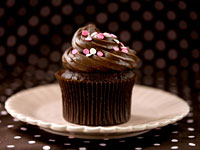
Remember when you were a kid and the best treat in the world was an ice-cream cone, or maybe a candy bar or even a Lifesaver? Sweets were often a reward for something. I remember a trip to the soda fountain following a particularly unpleasant trip to the doctor's office that involved a needle being stuck into my arm.
Those associations don't go away so easily. Tonight it's getting late, I'm home alone and I've spent the day catching up on things. I'm contemplating a trip to get some frozen yogurt.
Am I hungry? Not particularly. In fact, I'd say that my hunger on a scale of 1-10 is about a 1.5. But in my mind, the colors and flavors of that frozen yogurt seem bright and enticing. The whole thing seems to imply an escape, a trip somewhere, a sense of freedom--just like it did when I was a kid.
Recently I spoke with a colleague who also works with eating disorders about her love of the texture and warmth of oatmeal, how it says home to her and makes her feel like everything is going to be okay. She remembers her own mother serving it to her as a child. Now she sits in the kitchen in the morning, savoring a daily bowl of the gooey stuff, filled with oats and raisins and a bit of cinnamon, the steel cut oats thick and syrupy with heat.
Talking with her and reflecting on this tonight, I think about how much we imbue food with energy, with fantasy, with projection. It becomes so many things to us. It becomes whatever we want it to be, whatever we need it to be.
The problem, of course, comes when the fantasy food actually prevents us from facing what's happening in our lives; when the escape it provides means we're not listening to some inner stirring, restlessness or feeling trying to poke through into consciousness. A message from our bodies gets lost in translation: we're literally distracted from it by the compelling story we've created by food.
I wonder how our bodies feel about this: when food gets used to fill a need other than hunger, when the intellect or a knee-jerk need to flee from the present becomes the reason for a swirled cold cone or a piece of candy? My body probably tolerates it a bit, like any good partner would, the feeling of being ignored. But as this becomes habit, what happens next? Does the body shut down on us, feeling unheard? Does it scream louder, hoping we'll hear?
Perhaps this is what weight becomes: a message from our physical selves that our bodies are feeling ignored, that food is not being used to listen to and fuel our lives but to run away from them. Our bodies respond in kind with their own kind of distance: layers of flesh and softness that make us feel less alive in our own skin.
The next time you grab for that fantasy food, try checking in with the body and asking how it feels about going along for the ride. Is it willing to come? And if it's not, are you willing to put away the fantasy you believe that food will give you and sit with whatever feelings are really there right now, felt in your physical and emotional self?
Tonight for me there's a feeling of loneliness and quiet inside, the sense of wanting a break and a moment to breathe without pushing myself so hard. Sometimes for me that's the very function of the imagined food: it gives me a chance to slow down, to be out of my head and in my body. I have to ask myself, as we all do, if there are other ways to get there that still attend to what's happening in this moment, that don't ask my body to take on something it doesn't want.
That being said, there's a bath in the other room; there's a sky full of stars outside. There's music on the radio that might be calling us to dance. If you listened to your body and not your fantasy, what would might you reach for instead?
